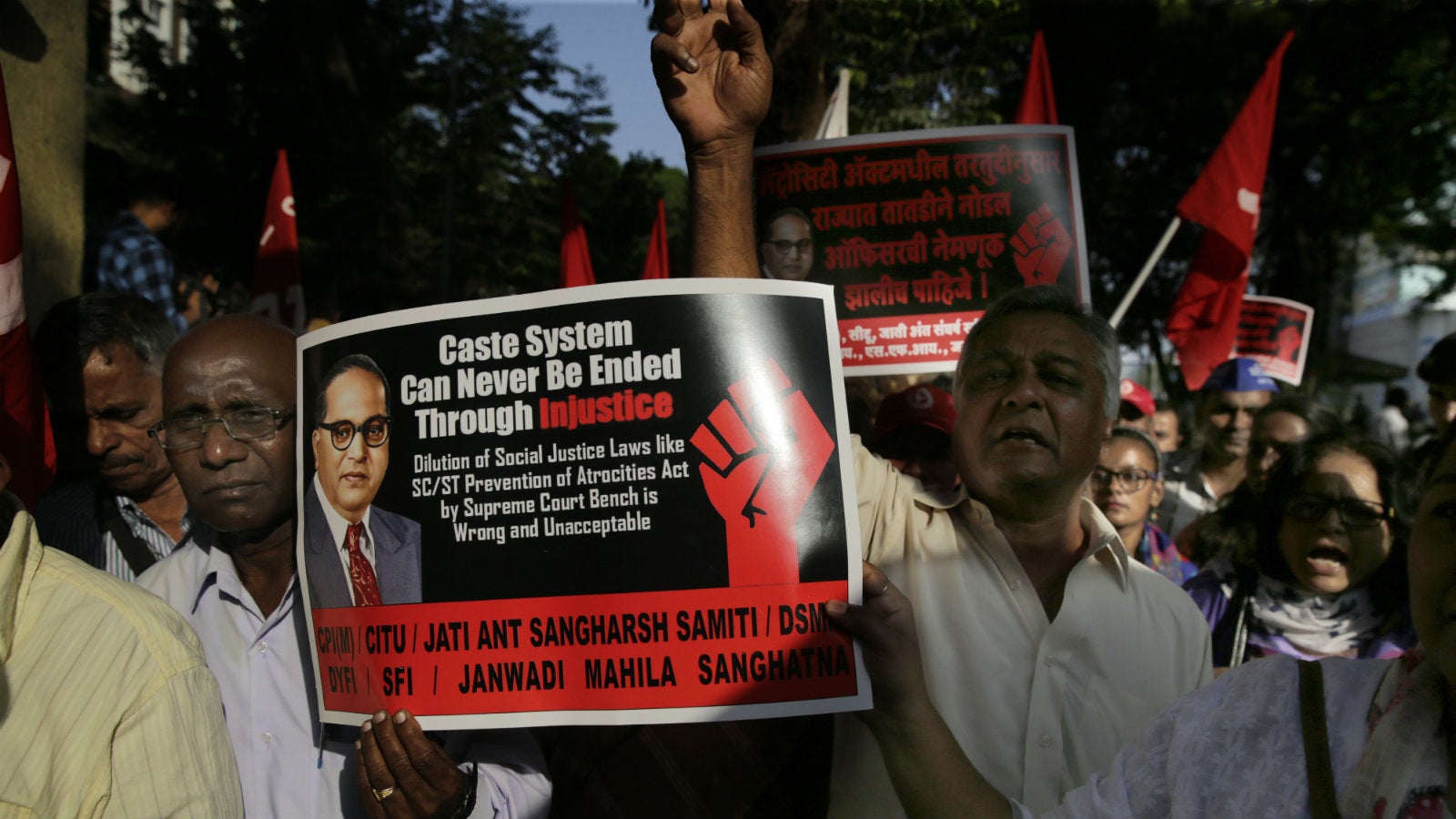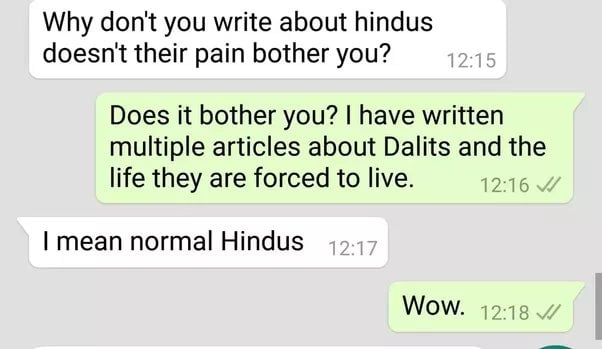A sociologist decodes the sly ways Indians talk about caste
This question originally appeared on Quora: What are some caste euphemisms in India? Answer by Koyal Bandyopadhyay, a sociologist and photographer. It has been edited for style and minor errors.


This question originally appeared on Quora: What are some caste euphemisms in India? Answer by Koyal Bandyopadhyay, a sociologist and photographer. It has been edited for style and minor errors.
The Story of Mr and Mrs Iyer
One fine morning, Mr Iyer was saying to Mrs Iyer:
“I’m telling you, Harish is really a good student of mine. I have big hopes for him. He is not like those other SCs, you know. He got through IIT through merit. He didn’t use his caste certificate. We need more people like him in today’s India…people who can actually forget his caste identity.”
“Hmm. By the way, did you post the ad for our daughter?”
“Yes, Ma’am! Both in the website and also on the paper”
“But you didn’t show me the draft?!”
“Okay…see it now!” (Takes out phone). “Here!”
‘Seeking 25-35, well-placed, animal loving, pure-vegetarian groom for our fair, good-looking, slim daughter, 23, 5’3’’ who works in a reputed MNC, caste no bar (though Iyer/own community preferred).’
“Is that the same thing you’ve put on the website?”
“Of course not. You need to write more. I’ve added ‘Non-Brahmins please excuse‘…and some lines as to her hobbies. Added some pictures.”
“I think we will get a good match for her. An educated son-in-law from a good family…is all we want. Bonus blessings by the grace of almighty if he is from the IIT.”
“Hmm…let’s see…by the Grace of God…”
“Did you see all the uproar in Bombay IIT over asking all the non-vegetarians [for] separate plates? This westernization is killing us all. Every thing becomes an issue. Why can’t we keep our culture?”
“I don’t know Mrs Iyer. These are difficult times. What’s wrong in keeping our culture?! This is our ethnicity…this is what has kept the country together for years. But those people will never understand!
“Arrey…you have reservation!! What more do you want? Some days back they were protesting by making pigs wear our sacred thread. Instead of being thankful that they can now no longer have to do manual scavenging, that seats and jobs are already being handed out to them….reserved….reserved!!! for them… they want to get more.”
“Clowns! I tell you. This is what happens when they don’t have a culture of education but vandalism and anger. Living with dirt makes them act with dirt in their minds too. You will never see a General Category community doing this—it’s always those people. Gandhiji tried to do so much for them, called them Harijans (Children of God) but look how they are.”
The doorbell rings. Mr Iyer opens the door, and sees Harish standing over there. He has come to invite them for his elder sister’s wedding.
Mrs Iyer smiles on seeing Harish. Thinks about what a good guy he is. Gets up to take out the cups and special bone china from the cupboard. Then she instructs her maid to make tea and serve Harish in that special bone china for the purpose. Mrs Iyer had a nice, intelligent maid, who never confused instructions.
She is also thankful to the almighty to get a Brahmin cook in today’s world when people are faking and cheating their identity to do anything. Only last year, a scientist in Pune was courageous enough to protest against this injustice.
Harish leaves after a while. He doesn’t take tea or water. Mr and Mrs Iyer are pleased to see that even after moving up in his life, Harish hasn’t forgotten how to pay respect. True, he has come to invite them for his sister’s wedding, but of course he won’t mind when Mr and Mrs Iyer won’t go to the wedding, even though they might not have any other work to do that day.
He won’t even mind when Mr and Mrs Iyer won’t invite him for their daughter’s wedding.
Mrs Iyer then remembers something. She called out to Mr Iyer:
“Did you put the word “progressive” in the ad? No? The groom’s family should know we have brought up our daughter with all kinds of liberties and privileges and that…she have had a modern upbringing, but she is firmly rooted in tradition.”
Mr Iyer: “I can put it in, but it might send the wrong signals. People might think we are not high caste in reality and have thrown away our traditions. We don’t need those gimmicky words. Our identity is enough.”
Mrs Iyer nods in agreement. She is thankful to the almighty and her parents that she got a wise, wary, protective husband in Mr Iyer.
To read the above story beyond the bold and italicized font, one needs to understand:
- What being non-vegetarian in India means:
The deliberate negation that is put to use here is so sublime that it qualifies to be a masterpiece. In one swoop, in one innocuous sounding three-letter-prefix, a boatload of negativity is attributed to the mere notion of eating meat. It incepts the idea that “vegetarian” is “normal” while meat (“non-vegetarian”) is “abnormal.” By extension, vegetarian is deemed “pure” and meat “impure.”
Then there is the whole “pure-vegetarian” crew, the large class of predominantly upper-caste Indians who are in love with “purity.” They would eat out only in “pure-vegetarian” joints or would demand that “non-vegetarians” use separate cutlery and crockery so that their “purity” does not get contaminated, as they did recently at IIT Bombay. When the students and faculty at one of India’s premier institutes for science and technology appear to believe that there is some tangible element of “impurity” in “non-vegetarians,” an “impurity” that is powerful enough to withstand modern detergents and dishwashers and to somehow contaminate their vegetarian “purity,” one begins to realise how deep-seated this prejudice and discrimination is.
The linkage they try to establish is pretty obvious:
Brahmins are vegetarians.
Vegetarians are “pure”.
Source: ‘Non-vegetarian’ is the biggest casteist scam that has ever been pulled on Indians
- What manual scavenging means:
Manual scavenging refers to the practice of manually cleaning, carrying, disposing, or handling in any manner, human excreta from dry latrines and sewers. It often involves using the most basic of tools such as buckets, brooms, and baskets. The practice of manual scavenging is linked to India’s caste system where so-called lower castes were expected to perform this job. Manual scavengers are amongst the poorest and most disadvantaged communities in India.
However, while manual scavenging for many may have ended as a form of employment, the stigma and discrimination associated with it lingers on, making it difficult for former or liberated manual scavengers to secure alternate livelihoods and raising the fear that people could once again return to manual scavenging in the absence of other opportunities to support their families.
Source: Breaking Free: Rehabilitating Manual Scavengers – UN India
- Also see: Manual Scavenging in the Times of Swachh Bharat
- Over 300 manual scavengers died in 2017
- A report by Human Rights Watch: Cleaning Human Waste | “Manual Scavenging,” Caste, and Discrimination in India
- How it defeats the whole purpose of Cleaning India, because caste prejudices relegate any work involving proximity to human waste to those from the lower castes and perpetuate manual scavenging: Swachh Bharat Is Focused On Using Latrines That People Won’t Use: An Interview With Diane Coffey
- What castelessness means:
A key to understanding caste, whereby upper caste identity can be a source of pride, the reference point of religious identity, but could be overwritten by professional identities of choice.
Conversely, for lower castes, your caste identity can never be your pride, you never become part of the religious monolith but you would be a “Dalit” against “Hindus,” and your caste identity is an indelible marker underlining all of your achievements.
The picture given below is not from my WhatsApp records, but it pretty much sums up what I, a labelled “anti-Hindu” often have to face:

Pitted against the normal “General category,” the Scheduled Castes and Scheduled Tribes of India are often described as “snatching our dreams” (our = “general category” people), in direct reference to the fact that lower castes cannot or shouldn’t dream. This is what is meant by “forgetting your caste.” Yes, it’s a cognitive dissonance of a higher order, thanks for asking (or not asking).
- What “merit” means:
The potent weapon of choice that’s supposed to dismember all of the “advantages” as enjoyed by SCs and STs. The argument of “merit” also masks the historical domination of the upper castes with regards to access to knowledge and resources.
The presumption: merit is that apple which Newton witnessed falling from the tree in his discovery of gravity—that is, it is very scientific and empirical and tangible, exists in a socio-historical vacuum, bereft of any privileged upbringing, not helped by nepotism and is not influenced by discrimination, as visible in equality of outcomes, and not equality in opportunity.
We welcome your comments at [email protected].